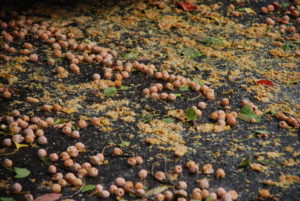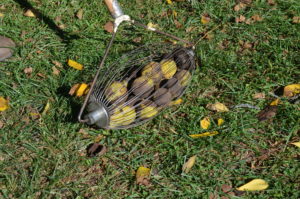Messy fruit from yard trees are dreaded by property owners as well as park and city employees. Some notorious culprits are sweetgums, sycamores (planetrees), oaks, mulberries, persimmons, and (female) ginkgoes. Fruits include hundreds of hard nuts or pulpy, smelly, and potentially hazardous covering sidewalks, driveways, and parking lots.
Foliar sprays are available to reduce or eliminate undesirable fruits from developing on trees. Timing of application(s) are critical and environmental factors make absolute control impossible. Results also vary by each chemical labelled to retard or eradicate fruit development.
For example, preventing acorns on your oak tree is to chemically burn male catkin and female flowers. No registered product is effective for all plants. Florel® is only growth regulator labeled to reduce acorn formation. Application time can often be pure guess work and may be successful less than 50% of the time. Multiple applications may be needed. Spraying your tree can be costly and time-consuming. Hand-removing flowers or small fruits may work on a small tree, but is impractical for large shade trees and for large properties.
Fruits numbers can vary from one year to the next. A mature walnut or oak tree may produce a heavy crop one year and a light one the following 1-2 years. Diseases, pests, and spring weather factors may injure flowers and reduce fruit production.
For large trees you should hire a licensed pesticide applicator or tree professional to achieve adequate results.
Timing of application: Spraying before or after flowers results in wasted time and money and time of application should be between 60 and 95°F. Follow label directions closely.
Chemicals are available to reduce or eliminate fruit set on ornamental trees and shrubs. Follow specific label directions for application rates and safety information.
Florel® Fruit Eliminator (ethephon)
Fruitone® (Naphthalene acid (NAA))
Sevin™ (Carbaryl) – warning: harmful to bees and other pollinators
One final option is to plant landscape plants that are not messy. Yes, lots of beneficial trees produce fruits, but birds and other wildlife usually consume most of them. Male cultivars of large landscape tree include honeylocust (Gleditsia), ash (Fraxinus), fringetree (Chionanthus), redbud (Cercis), and others. Avoid planting hollies and other fruit producing plants adjacent to walkways.



 Posted in
Posted in 
